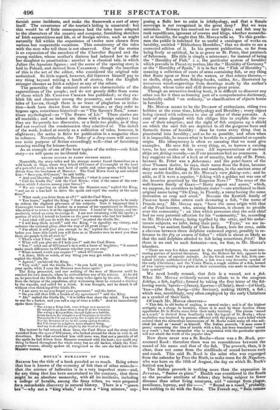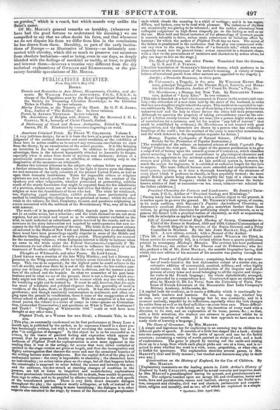MOtTLE'S HERALDRY OF FISH.
SELDOM has the title of a book puzzled us so much. Being attars that less is known of the economy of fish than of other animals— that the science of halieutics is in a very imperfect state—and, for any thing that has been ascertained to the contrary, that there might be an absolute monarchy, with all its incidents, including a college of heralds, among the finny tribes, we were prepared for a remarkable discovery in natural history. There is a "queen bee"—why not a "king whale," or even a "king minnow," sup- posing. a Salic law to exist in ichthyology, and that a female sovereign is not recognized in the great deep ? But we were mistaken. Science has received no new lights ; and fish may be rank republicans, ignorant of crowns and kings, whether monarchi- cal or heraldic, for aught that Mr. MouLE tells us. To this gentle- man the public is Indebted for so useful a catalogue of works on heraldry, entitled " Bibliotheca Heraldica," that we desire to see a corrected edition of it. In his present publication, so far from being lively or satirical, he is as grave as St. Peter, that patriarch of fishermen. His title is simply a misnomer ; for instead of being the " Heraldry of Fish," i. e. the particular system of hemldry which prevails in Piscatory realms, like the " Heraldry of Germany " or the " Heraldry of Spain," it is in fact the "Fish of Heraldry"; meaning a collection of coats of arms containing fish, or any thing that floats upon or lives in the waters, or that relates thereto,— as shells, ships, anchors, fishing-books, cables, &c., illustrated by numerous wood-engravings from drawings made by the author's daughter, whose taste and skill deserve great praise.
Though an attractive-looking book, it is difficult to discover any other use for it than as forming part of a comprehensive dictionary, technically called " an ordinary," or classification of objects borne in heraldry.
Mr. Moors seems to be the Ducaow of enthusiasts, riding two hobbies at the same time, Ichthyology and Heraldry ; every object being viewed with reference to one or other of these pursuits. A coat of arms charged with fish obliges him to explain the rea- son of their adoption ; and the sight of fish conjures up a shield on which the said fish are depicted in all the gorgeous hues and fantastic forms of heraldry : thus he turns every thing that is piscatorial into heraldry ; and as far as possible, and often when it is impossible, he traces what is heraldic to a piscatorial or aquatic origin. His idiosyncrasy is often so amusing that we must give examples. He sees fish in every thing, or, to borrow a canting term, he has scales on his eyes. All representations of ancient ships arefisking-vessels,—as if our ancestors had no commerce. A key suggests no idea of a lock or of security, but only of St. Peter, because St. Peter was a fisherman; and the peter-boats of the river Thames derive he says, their name from the Saint, because they are used for fishing. Frets and mascles, in the ancient arms of many noble families, are in Mr. MOULR'S view fishing-nets; and he adds, as if it were a sequitur, " fishing with a golden net was one of the luxuries practised by the Emperor Nero l " The arms of the well-known family of GREY—" Barry argent and azure," which, we suppose, he considers to indicate water !—are attributed to their original name being "De Croy, in Picardy, a name having the same derivation as crag and creek." Because the Kentish family of PROUDE bears three otters each devouring a fish, "the name of Proude may," Mr. MOULE says, "have the same origin with that of the Prud-homme, who, among fishermen, is chosen to preside over the community" : an idea which presumes that the said chief had no very paternal affection for his "community," be, according to Mr. MOLE'S theory, being typified by the otter, and unfor- tunate subjects, we infer, being their prey. " Fryer," we are in- formed, "an ancient family of Clare in Essex, bore for arms, sable a chevron between three dolphins embowed argent, possibly in re- ference to the fry or swarm of fishes" : which is about as likely as that the said dolphins alluded to fish being sometimes fried! But there is no end to such fantasies—nor, we fear, to Mr. MOTILE'S blunders.
" There are very few fishes named in the sacred Scriptures, the most inte- resting portion of ancient literature. Dag, the Hebrew for fish, appears to be a general name of aquatic animals. As the Greek word for fish, /etis, con- tained initials emblematical of Christ, a fish was a very favourite symbol of the early Christians; and the Vesica Piscis, a rough outline of a fish, formed of two curves meeting in a point at their extremities, was made to enclose the holy symbol."
We need hardly remark, that Ictis is a weasel, not a fish. What Mr. MOULE evidently meant to allude to is the anagram Ichthys, a fish, (ix64); formed by taking the first letter of the fol- lowing words, Ilsrav—(Jesus), Xptcrros—(Christ), esoii— (of God), 'Ytor—(the Son), 2orrip—(the Saviour), making 1Xer2, a fish ; which was, accordingly, very often employed by the early Christians as a symbol of their faith.
Of roach Mr. MOULE observes- " This fish, in old books of angling, is named roche ; and is of the highest antiquity as a charge in heraldry, where it is used by those families whose appellation De la Roche arose from their rocky territory. The phrase sound as a roach' is derived from familiarity with the legend of St. Roche ; whose mediation was implored by persons afflicted with the plague, and a belief which existed that the miraculous intercession of St. Roche could make all who soli- cited his aid as ' sound' as himself. The Italian proverb, ' E sano come it peace,' connecting the idea of health with a fish, has been translated ' sound as a roach '; but the naturalist who is acquainted with the particular species will not admit the truth of the popular idea.'
Now there never was a St. Roche—there was a St. Roch, pro- nounced Rock : therefore there was no resemblance between the sound of his name and that of the fish. The proverb, then, it is clear, does not come from the similitude of sound between rock and roach. This said St. Rock is the saint who was expunged from the calendar by Pius the Sixth, to make room for St. Napoleon, who was born on the 16th of August, the day on which St. loch's festival was kept. The Italian proverb is nothing more than the expression in Juvssui, " Senior es pisce." Health was considered in the South as the peculiar attribute of fishes ; they being subject to fewer diseases than other living creatures, and " exempt from plague, pestilence, leprosy, and the —." " Sound as a roach," probably, has nothing to do with the Saint. The French say, " Salo comme un gardon," which is a roach, but which sounds very unlike the Saint's name.
Of Mr. Moulds general remarks on heraldry, (whenever we have had the good fortune to understand his meaning,) we are compelled to say that we often doubt his facts, and that whenever we do not dispute his facts we differ from him in the conclusions he has drawn from them. Heraldry, as part of the early institu- tions of Europe— as illustrative of history—as intimately con- nected with chivalry, which did so much to preserve our ancestors from absolute barbarism—and as being, even in our days, so deeply blended with the feelings of mankind as tacitly, at least, to gratify and interest them—deserves a treatise very different from the dry technical explanations of GWtLLIM and EDMONSTONE, or the pis- calory-heraldic speculations of Mr. Monr.E.



























 Previous page
Previous page